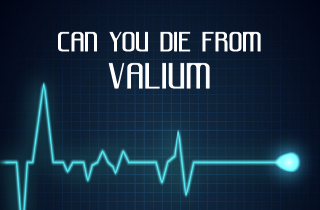Yes.
An overdose of Valium can result in death. Or you can have a serious accident while on Valium.
More here on the dangers of taking too much Valium, including when you can get addicted to Valium. Plus, we offer a section at the bottom for your question about taking Valium. We try to respond to all legitimate Valium questions with a personal and prompt response.
What’s in Valium?
Valium contains diazepam, a benzodiazepine which is a central nervous system depressant. The diazepam contained in Valium can create a state of intoxication similar to alcohol.
Valium effects on the central nervous system
Valium – how long does it last in your system? Although Valium effects peak 3-4 hours after dosing, they can last up to 9-10 hours. And Valium can stay in your system for days. At low doses, diazepam is a moderate tranquilizer, causing sleepiness, drowsiness, confusion, and some loss of ante-retrograde memory. Valium can also make you feel high. Diazepam can produce a state of intoxication similar to that of alcohol, including slurred speech, disorientation, and drunken behavior. And at high doses, excitement, dis-inhibition, severe sedation, and effects on respiration occur, particularly if respiration is impaired by other drugs or by disease.
Although the elderly are more likely to develop significant adverse central nervous system effects from the use of diazepam, anyone can experience adverse effects from Valium. Possible side effects on the central nervous system as a result of taking Valium may include:
- blurred or double vision
- depression
- diminished reflexes
- dry mouth
- excessive perspiration
- headache
- hypotension (low blood pressure)
- loss of full control of bodily movements (ataxia)
- nausea and vomiting
- tremor
- urinary retention
- vertigo
Signs of Valium Overdose
The leading cause of death while taking Valium is overdose, because valium suppresses the respiratory system, resulting in coma and possible death. During overdose, paradoxical reactions of anxiety, insomnia, stimulation, hallucination, and acute hyperexcited state may occur. Shallow breathing, clammy skin, dilated pupils, weak and rapid pulse, coma, and death are also possible. But the hallmark of this overdose is falling into a deep sleep or “coma” while still being able to breathe adequately. Symptoms of Valium overdose may include:
- bluish-colored lips and fingernails
- blurred vision
- breathing – labored
- confusion
- depression
- dizziness
- double vision
- drowsiness
- excitability
- hiccups
- rapid side-to-side movement of the eyes (nystagmus)
- rash
- stomach upset
- stupor (lack of alertness)
- tiredness
- tremor
- uncoordinated movement
- weakness
Other dangers of taking Valium
Another reported cause of death from Valium use included vehicle and machinery accidents. Sensory impairment and reduced reaction times occur when you take Valium, making driving hazardous and often deadly. And some cases of death have been reported as the result of driving heavy equipment or automobiles while on Valium.
How to treat Valium Overdose
If you are in need of medical help after Valium overdose, immediately get to an emergency medical facility. Call 911 or the National Poison Control Center (1-800-222-1222) to talk to experts in poisoning. They will give you further instructions on emergecy care for Valium overdose. Health care providers will then measure and monitor your vital signs, including temperature, pulse, breathing rate, and blood pressure. Tests, such as an EKG, may be done to check heart function. Symptoms will be treated as appropriate. Actions taken for valium overdose may include:
- activated charcoal
- breathing support (artificial respiration)
- fluids through a vein (by IV)
- laxative
- medicine (antidote) to reverse the effect of the overdose
- tube through the mouth into the stomach to empty the stomach (gastric lavage)
Valium addiction and treatment
Diazepam is capable of causing mild physical and psychological dependence and is regarded as having a significant abuse potential. This is because it is possible to get a Valium high feeling from the drug. Plus, the long half-life of diazepam may cause accumulation to occur with repeated use, and IV use of the drug can increase tolerance. At this point, overdose can easily occur with serious side effects, including death.
If you or someone you know is taking more Valium than prescribed, for an extended period, or smoking/snorting/injecting Valium … they may develop a tolerance and experience withdrawal on discontinued use. Abstinence or abrupt withdrawal is not recommended. Instead, doctors suggest that you withdraw from Valium under medical supervision. Learn more about Tranquilizer Addiction and Treatment Program considerations, what you can do to address addiction, and what are your long-term rehab and recovery options. Help is available TODAY!
Fatal Valium questions
Do you still have questions about the risk of fatality on Valium? Please leave us your questions here. We will be happy to try to respond to you quickly, and with a personal reply. Remember: You are not alone!









Related Posts